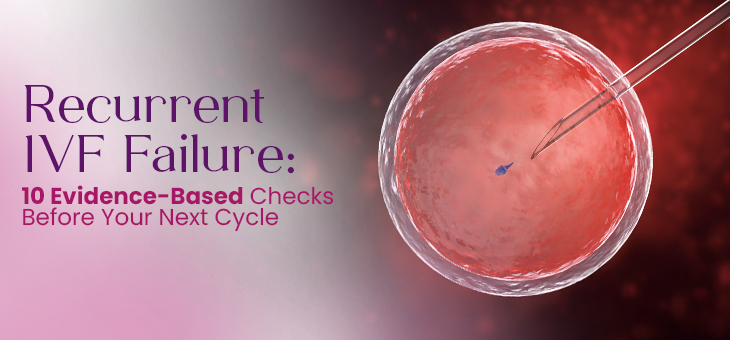Recurrent IVF Failure: 10 Evidence-Based Checks Before Your Next Cycle
Introduction
IVF may be an exciting and sometimes heartbreaking journey. Couples who experience recurrent IVF failure, defined as two or more unsuccessful cycles, may feel nervous, frustrated, and uncertain about what to do next. However, experiencing one unsuccessful cycle can be emotionally taxing. Knowing the reasons behind a failed IVF cycle is essential before trying another one because it can significantly enhance results.
Specialists at a trusted IVF hospital in Bangalore approach each case with evidence-based evaluations to optimize success rates. By identifying the underlying causes of failure, they create a tailored plan that addresses both physical and emotional aspects of fertility.
Understanding Recurrent IVF Failure
Recurrent IVF failure refers to the inability to achieve pregnancy after multiple IVF cycles. While the exact number defining “recurrent” varies, most experts agree that two or more failed attempts warrant a thorough investigation. Common contributing factors include:
- Embryo quality: Poor-quality embryos are less likely to implant successfully.
- Uterine issues: Fibroids, polyps, or scarring can interfere with implantation.
- Hormonal imbalances: Thyroid dysfunction, elevated prolactin, or low ovarian reserve can reduce success rates.
- Immune factors: Autoimmune disorders or abnormal natural killer (NK) cell activity may hinder embryo acceptance.
Consulting the best gynecologist in Bangalore ensures a scientific and compassionate approach. Their expertise allows couples to understand the reasons behind previous failures and make informed decisions about future cycles.
10 Evidence-Based Checks Before Starting the Next IVF Cycle
1. Comprehensive Hormone Evaluation
Hormones play a pivotal role in fertility. Assessing thyroid levels, prolactin, and anti-Müllerian hormone (AMH) helps gauge ovarian reserve and uterine receptivity. Correcting imbalances can enhance egg quality and create a more receptive uterine environment.
2. Advanced Uterine Assessment
Uterine abnormalities like fibroids, polyps, adhesions, or a thin endometrium can hinder implantation. Procedures such as hysteroscopy or laparoscopy provide accurate visualization and enable corrective measures before the next IVF attempt.
3. Genetic Testing for Both Partners
Chromosomal abnormalities in either partner can affect embryo development. Pre-IVF genetic screening allows couples to understand potential risks and select viable embryos, reducing the chances of recurrent failure.
4. Sperm DNA Fragmentation Test
Traditional semen analysis assesses quantity and motility but may miss subtle DNA damage. A sperm DNA fragmentation test identifies hidden male factors, enabling targeted interventions to improve fertilization outcomes.
5. Embryo Quality and Laboratory Review
The quality of the embryology lab and culture conditions directly impacts success rates. Reviewing previous lab protocols and ensuring experienced embryologists handle your case can improve the chances of a successful pregnancy.
6. Endometrial Receptivity Testing (ERA)
Even high-quality embryos fail if implantation timing is off. ERA testing identifies the optimal window for embryo transfer, ensuring synchronization with the endometrium for higher implantation success.
7. Immune and Autoimmune Screening
Immune-related implantation issues, such as abnormal NK cell activity or autoimmune disorders, can hinder pregnancy. Screening for these conditions allows for interventions like immunotherapy or medication adjustments.
8. Lifestyle and Nutrition Factors
Lifestyle choices significantly affect IVF outcomes. Maintaining a healthy weight, managing stress, ensuring adequate sleep, and avoiding toxins like alcohol or smoking can improve both egg and sperm quality.
9. Doctor’s Expertise and Protocol Review
Personalized IVF protocols, including stimulation regimens and medication plans, are essential. Specialists at the best fertility hospital in Bangalore tailor treatments to individual patient profiles, optimizing every step for higher chances of success.
10. Psychological Readiness
Repeated IVF failures can take a toll on mental health. Addressing emotional well-being through counseling, support groups, or therapy ensures couples are psychologically prepared for the next cycle, improving resilience and coping strategies.
The Role of a Multidisciplinary IVF Team
A cooperative approach is necessary for successful IVF. Counselors, embryologists, and fertility specialists cooperate to create individualized treatment plans. Transparent communication boosts confidence and lowers fear throughout the process by ensuring that couples are informed and participate in every choice.
Why Choose Cambridge Hospital
The proficiency in handling complicated reproductive situations and repeated IVF failures is something that Cambridge Hospital is notable for. Other benefits include:
- Advanced technologies: Modern lab setups and techniques such as ERA Testing and DNA fragmentation analyses.
- Personalised Care: Treatments that are specifically designed for every couple to increase their chances of success.
- Sophisticated and Comfortable Atmosphere: Caring staff members who offer both medical care as well as emotional support result in a comprehensive experience.
- Experienced doctors: Highly qualified doctors' team including the best gynecologist in Bangalore ensures that every aspect of care is evidence based and patient first.
Experienced multidisciplinary team in Cambridge Hospital focuses the couples on both clinical outcomes and emotional support.
Conclusion
Continuous IVF failure can be discouraging, but this is not the end of the fertility journey and it doesn't signify it. From hormone assessments and uterine checks to genetic testing and lifestyle optimization, these evidence-based evaluations offer a roadmap to improve the success rates in future.
Every IVF cycle provides valuable insights and couples can turn setbacks into learning experiences with the right support. Parenthood is within reach when partnering with a trusted IVF hospital in Bangalore like Cambridge Hospital where the couple will be guided by experienced specialists.
Personalised care and hope will definitely transform your IVF journey into a beautiful and expecting one which you've always dreamt of.


